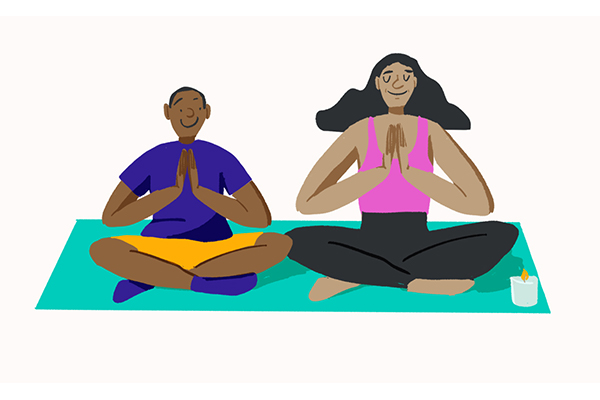With exams, social pressure and big changes, it’s no surprise that a lot of teens feel stress and anxiety. Around 20% of teens may experience mental health problems like anxiety disorders, in any given year.
The good news is that there are some simple things they can do to cope with feelings of stress. From breathing exercises to eating more together – there’s scientific evidence to prove these kinds of activities can lessen their stress response and help them feel less overwhelmed.
Here, we share 6 scientifically-proven mindful activities that can help to lower stress. And because we know that developing new habits can be difficult for anyone – not just teens – we also have advice for making them doable and easy to fit into busy lives.
1. Going for a walk in nature
How can it help?
It’s not surprising that a walk outside can help you feel calmer. However, a new study is the first to prove a direct link between walking outside in nature and improved brain health. Researchers found that walking for an hour in a green space – like a park, woodland or countryside – dampens the stress activity in your brain.
Try it:
Encourage your teen to go for a walk outside during their study breaks. Even better, go together. Make a conscious effort to notice the sounds and sensations you feel when you walk, as this can help us feel more present – and less overwhelmed.
2. Trying out some deep breathing
How can it help?
A growing number of studies show that diaphragmatic breathing (using your belly to draw your breath all the way into the bottom of your lungs) can help your body and mind to relax. A recent study by Yale University found that breathing exercises were one of the most effective mindful activities for both immediate and long-term stress reduction.
Try it:
Deep breathing is easier to do when someone shows you how or demonstrates. So, the next time your teen feels overwhelmed or is struggling to focus, try a simple breathing exercise together.
Square breathing is a good one. Breathe deeply in through your nose for four seconds, hold for four seconds, breathe out through your mouth for four seconds, hold for four seconds and repeat. You can also check out Headspace’s breathing techniques.
3. Doing some mindful meditation
How can it help?
You don’t need to sit cross-legged for hours to feel the benefits of meditation – just 5-10 minutes can help you feel calmer. Some studies have also suggested that meditation can reduce stress overload and increase self-esteem, optimism and sleep quality.
Try it:
Your teen might struggle with the idea of being still, so start small and simple. Try focusing on a lit candle and watch the flame flicker for 5 minutes, allowing thoughts to come and go, without judgement. It’s a great intro to meditation and tuning into the simple movement of the flame can help you feel more present and shift away from worrying thoughts.
4. Practicing mindful eating
How can it help?
When it comes to mealtimes, many of us quickly eat our food while watching TV, scrolling on phones or on the go. This autopilot response can also cause bloating and tummy troubles – which in turn can be caused by and perpetuate feelings of stress. Research has found that eating more slowly and mindfully helps to signal to our body to properly rest and digest.
Try it:
It sounds simple, but just eating together at the table more often is a great first step, without the distractions of screens or work. Try encouraging everyone at the table to savour their food, eat a little slower and focus on the flavours and textures of our food.
5. Keeping a gratitude journal
How can it help?
Thinking more about the things you’re grateful for can have a positive effect on your mood. Gratitude researchers have found that people who write things they’re grateful for (versus the things that irritate them) feel more satisfied and motivated. Writing in a gratitude journal for 15 minutes before bed could even help you sleep better – all things that can counteract feelings of stress.
Try it:
Your teen might already be keeping a diary so you could simply encourage them to include the things they’re grateful for. If they don’t like the idea of keeping a journal or writing a gratitude list, even just talking through what they might be thankful for at the end of each week can help them develop a more optimistic outlook and ease anxiety.
6. Guided sleep meditation
How can it help?
Guided sleep stories are becoming increasingly popular – everyone from Harry Styles to Mary Berry have recorded them for brands like Calm. If this isn’t enough reason for your teen to try one out, they’ve been proven to quieten anxious thoughts and help your body prepare for deeper sleep.
Try it:
This one is great for peak exam period when your teen might be struggling to nod off the night before a test. Calm, Headspace and Happy Place have some great sleep stories to try out, which could help your teen to focus on relaxing and not on whirring thoughts.
Some of these mindful activities might work better than others for your teen, so it’s all about exploring what works for them when it comes to lowering and managing their stress levels.
Either way, just talking about the effects of stress and helping them explore the things they can do to feel more in control of their stress levels is a big help. Trying out mindful activities together also comes with some stress-reducing benefits for you, too!




